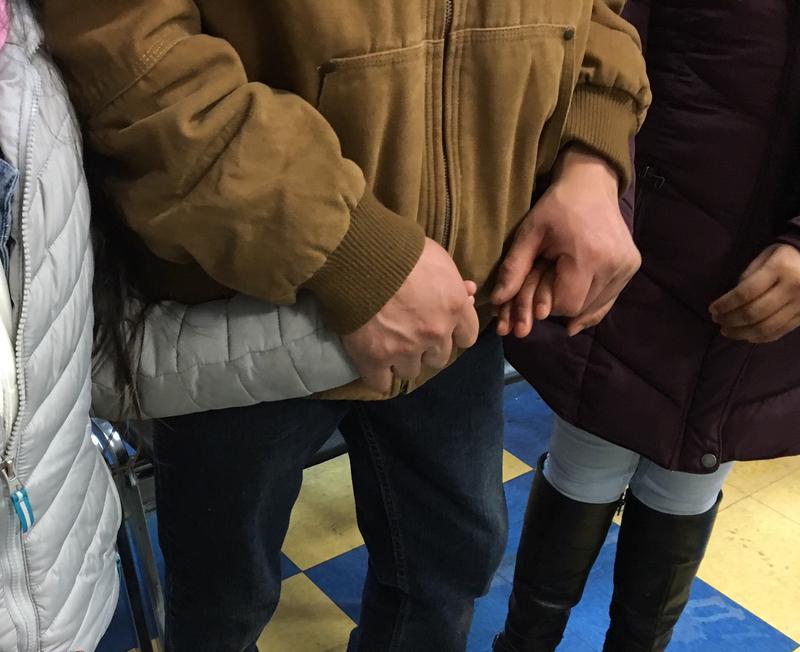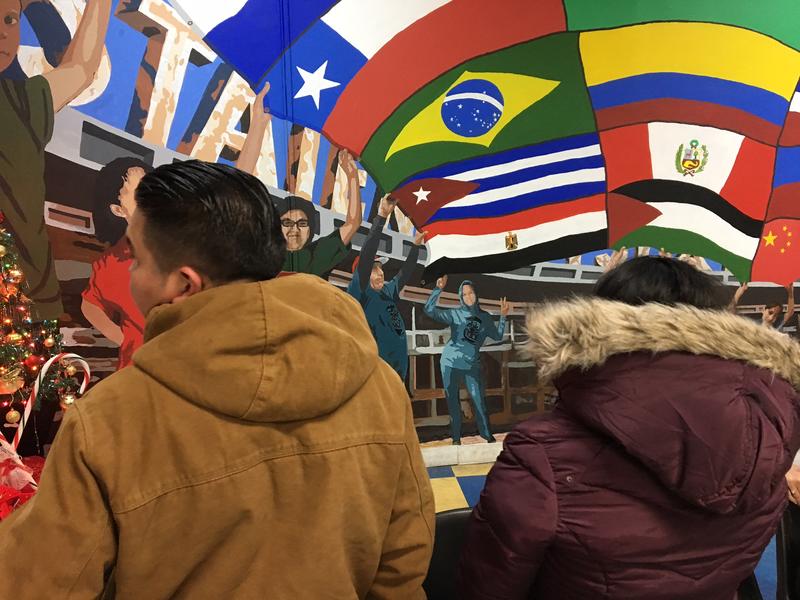
Shortly after President Trump was elected in November, 2016, State Attorney General Eric Schneiderman warned immigrants that unsavory people were trying to take advantage of their fear of the new president-elect, by offering them phony services or by threatening to deport them unless they paid money. He urged them to contact authorities.
"There is a robust infrastructure of government and nonprofit agencies in place in New York to help anyone who is scared and anyone who is threatened," he said at a press conference, surrounded by posters with the phone number for a hotline run by the state's Office for New Americans. "People are understandably frightened, and frightened desperate people are the number one target of scammers."
More than a year later, WNYC wanted to know whether the New York state agencies and authorities that help immigrant victims of fraud had received more complaints in 2017 than in 2016. The answer we heard again and again: No.
The Hotline
The New Americans Hotline serves immigrants in many ways, but it also takes complaints about scams. It's run by Catholic Charities.
Raluca Oncioiu, the organization's director of immigration legal services, said 35 complaints were logged by the hotline in 2017. But she said it received 60 the previous year. Oncioiu acknowledged that 2016 figure could have been higher because of a special phone bank event. Nonetheless, she said, people calling in 2017 seemed more skittish.
"I think they wanted to tell us what happened," she explained. "But at the last minute, when we’re trying to get their consent to complete the form, they just - they said no."
Oncioiu said the hotline did receive complaints about email scams and phone calls from people threatening deportation, which are very difficult to trace. Catholic Charities forwards these complaints to law enforcement. It also gives assurances to immigrants that their status will not be affected by filing a complaint.
District Attorneys
There is no central repository for tracking immigration scams in New York. They're typically handled by local law enforcement. WNYC reached out to 22 district attorneys in some of New York's largest counties with immigrants, asking if they'd received complaints. We heard back from 14, seven of which had information.
Those seven are in the counties of Queens, the Bronx, Brooklyn, Manhattan, Nassau, Orange and Westchester. They have their own immigration units and belong to the New York State District Attorneys’ League of Immigrant Affairs (DALIA). Manhattan was the first to create such a unit back in 2007.
Between these offices, they'd prosecuted a total of six individuals last year. Those include two people in Orange who allegedly provided immigrants with fake visas and plane tickets, and made false promises about being able to obtain green cards. Nassau arrested a man who posed as an attorney.
But like the hotline, the seven prosecutors' offices received fewer complaints in 2017 than in 2016, according to Silvia Finkelstein, an assistant DA in Nassau who also heads DAILA.
"In 2016, our dedicated hotline received between 60 and 70 calls directly from complainants seeking to file a complaint," she said, referring to her Nassau office. "And since January [2017], we have only received five."
A spokesman for the Brooklyn DA said the office received 210 complaints in 2017 compared to 398 in the previous year.
"Our communities are terrified of coming forward even when they are victims of crimes," Finkelstein added. "And I’m not just talking about financial crimes I’m talking about all crimes. Child abuse, sexual abuse, human trafficking, public corruption, elder abuse, domestic violence. Everything that we deal with as an office, assault cases, gang assault cases. The victims are terrified coming forward because they’re afraid that if they report the crimes they’re going to get deported."
One of the most common scams is the "ten year visa." Undocumented immigrants who have been in the U.S. for a long time are falsely told by unscrupulous attorneys that they qualify for a green card. But what they're really filing for is asylum — and they rarely qualify if they've been here for more than a year.
Filling out the asylum application enables them to get working papers while the case is reviewed, a process that can take a few years. Because of a lack of English literacy, the unknowing victim doesn't learn that they applied for asylum, instead of a ten year visa, until they're called for an asylum interview and then placed into deportation proceedings.
Juana and Alex, a Mexican couple on Staten Island, said this happened to them in 2012. They didn't realize it was a scame until their asylum interview in November of last year. They're now looking for a new lawyer who can help them fight deportation before their immigration court date in March. Juana said it never dawned on them to call the authorities. They have two young American-born children and worry about being separated.
"I’m undocumented," she said in Spanish. “And after the president came in it’s easier for us to be deported than for people to help us.”
The couple declined to provide their real names because of the danger they're in.
But Luis, who also fell the visa scam, did step forward. The Staten Island resident doesn't want to reveal his name because his case is still proceeding. He contacted the city's Department of Consumer Affairs and a district attorney after getting a new lawyer with Make the Road New York who helped him withdraw his phony asylum application.
"Learning that it was a fraud and having attorneys on my side motivated me to report it," he said, in Spanish.
New York City's Department of Consumer Affairs
Although it's not able to bring criminal charges, Consumer Affairs can investigate complaints and leverage fines. In 2017, the office received 21 complaints compared to 30 in 2016, according to a spokeswoman.
The office also conducts investigations even without the help of a complaint. Last September, the office fined a nonprofit and its president $1.3 million for engaging in deceptive practices following an investigation by WNYC and Telemundo 47.
The State Attorney General
The AG's office does not have general jurisdiction to prosecute crimes in New York. But a spokeswoman said it can go after certain types of fraud, such as those perpetrated by someone unauthorized to practice a profession.
A fake Brooklyn attorney was convicted of defrauding immigrants in June. In December, Schneiderman sought criminal and civil contempt charges against a phony lawyer who'd been busted once before.
"We know that scammers are trying to take advantage of this climate of fear by targeting vulnerable communities," Schneiderman said in a statement, when told complaints to local authorities went down in 2017.
"It’s so critical that these scams be reported. My office stands ready to use all tools at our disposal to bring to justice those who try to defraud New York’s immigrant communities — and we will never ask for your immigration status or share immigration info with federal authorities if you report potential scams to our office."
Who to Call
If you're concerned about a potential scam, you can call the Hotline for New Americans at 1-800-566-7636. Or you can call 311 and the city will refer you to the Department of Consumer Affairs and other relevant agencies.
The city says Action NYC is the best place to find trustworthy immigration legal service providers. That program can also be contacted by dialing 311.

